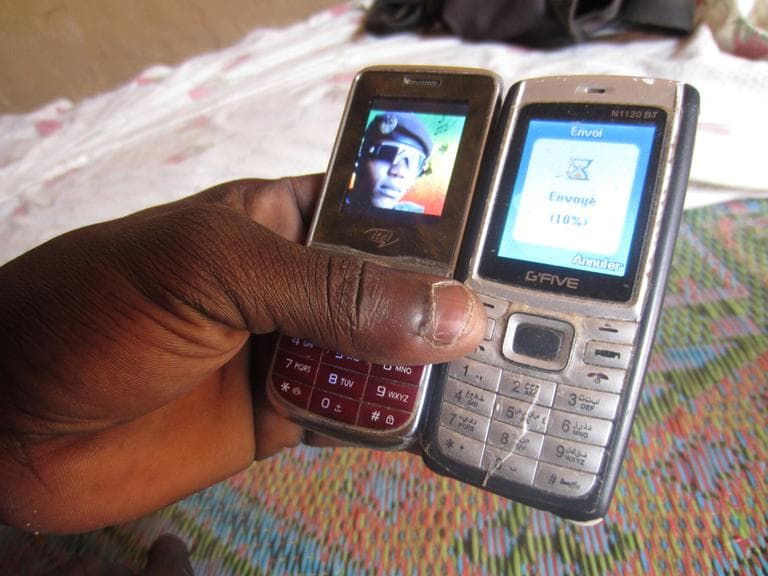Advertisement
Mali Music Culture Defined By The Cellphone
ResumeIn Northern Mali, one of the towns where French and African troops have been trying to unseat Islamist rebels is Kidal — a small, dusty hub of trans-Saharan traffic and trade.
Portland, Ore., musicologist Christopher Kirkley spent several months there in 2009 and 2010, collecting music rarely heard by the rest of the world.
He had traveled to West Africa with an acoustic guitar, a digital recorder and a small laptop, with the intention of recording traditional guitar music.

Instead he found the Saharan soundscape full of tinny digital audio blaring from cheap, off-brand cellphones.
"People use them as portable hard drives," Kirkley said. "It actually was kind of a pain when I first encountered it, because I was there with my microphone, expecting to be trading these folk songs while people were playing them on guitar. And a lot of times I'd ask somebody, I'd say, 'Play that song you were talking about, that old rebellion song.' And rather than play it, someone would take out their cellphone and hit play."
People were sharing the songs using Bluetooth wireless technology, which works without phone service or Internet.
With villagers, nomads, immigrants, traders, truck drivers and refugees all crossing paths in Kidal, the web of music Kirkley found there was like "the Internet without the Internet," he said.
He started collecting the MP3s from the cellphone memory cards, and has since put out two compilations of Saharan cellphone music — the latest was just released on vinyl.

"These MP3s that are on cellphones often don't have any information on them besides a file name and an ID3 tag, so when it came to tracking down the musicians, it was a really laborious process of trying to decode this really minimal information and find out A, where the musician was coming from and B, who they were," Kirkley said.
Much of the music he collected from cellphones is the product of a "DIY revolution of cheap technology," Kirkley said — songs created on computers in homemade studios in villages and towns. Occasionally, songs were recorded directly onto cellphones.
Many of the people Kirkley met in Kidal have since fled, because of the extremists who took over. In some places, extremists have instituted Sharia law, essentially banning cellphone music.
"The Islamists have actually even taken to destroying cellphone towers, seeing them as indicative of this popular music culture," Kirkley said.
The phones have also been one of the only ways to capture the conflict there.
Kirkley plans to return to Mali next month — this time with the goal of collecting videos relating to the rebellion.
"Once the data isn't transferred anymore, then it does disappear, due to size constraints on cellphones and the fact that it's not being archived," Kirkley said. "So in particular with the rebellion, I think that the really important story of what's been happening in Northern Mali does exist on cellphone medium. And we'll see what happens."
More stories about Christopher Kirkley:
- Willamette Week: Africa High-Tech
- Motherboard: Inside the Cell Phone File Sharing Networks of Western Africa
- The Guardian: Desert discs: how mobile phones are at the root of Saharan music
Songs heard in this piece:
(Liner notes by Christopher Kirkley)"Friday" - This short intermission is from Egypt. The vocals are a young child talking about Friday: "Today is friday lets go buy a sheep, a bird maybe, the chicken is expensive, but let's go and forget about our problems..." The melody is taken from Alpha Blondy's "Brigadier Sabari," famous throughout the continent and considered to be the first African reggae song.
DJ Mopao, "Pèguèlè" - Sidibé Tidiane is an Ivorian-Malian who first began playing music as a DJ in Ivory Coast, rising to popularity with the success of Coupé Décalé. Arriving in Mali in 2006, he released the song Pèguèlè with the dance group DJ Mystral. Pèguèlè literally translates to "small buttocks" and is an ode to small sizes of the aforementioned body part. His first hit has been followed by a full length album in July of 2011. He continues to DJ in Bamako's prestigious Ibiza night club.
Pheno S, "Waihidjo" - Pheno S. is a young rapper from Gao, Mali, where Hip Hop is a very recent phenomena. Influenced by groups like Lakal Kaney and Kadian Gaskia, Pheno was launched into local fame when he took on a school director in a song, composing a rap that was released on cellphones - insulting the director for misconduct and sexual relations with students. The resultant public scandal cemented his status as rapper. "Waihidjo" carries in Pheno's tradition of emphatic messages, a song that preaches the importance of marriage.
Iba One, "All (Remix)" - Iba One is one of the best known Malian rappers with a staccato high energy flow. One of Mali's first Hip Hop celebrities, he regularly fills stadiums and has contracts with some of the largest businesses in Mali (incidentally, cellphone companies) to organize concerts and events in the capital. His instrumental production is by Sidiki Diabaté, son of acclaimed musician Toumani, who has forged the contemporary sound of Malian Hip Hop - with heavy synth, pitch bends, and trap music stylings.
Guest:
- Christopher Kirkley, Portland, Oregon-based musicologist. His record label is Sahel Sounds. He tweets @sahelsounds.
This segment aired on February 25, 2013.